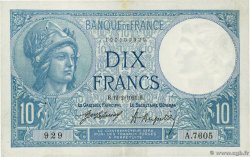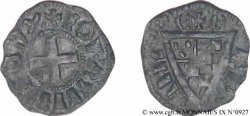fme_1054038 - POLONIA - INSURRECTION Médaille, l’Héroïque Pologne
70.00 €
Menge
In den Warenkorb

Type : Médaille, l’Héroïque Pologne
Datum: 1831
Name der Münzstätte / Stadt : France, Pologne
Metall : Bronze
Durchmesser : 51 mm
Stempelstellung : 12 h.
Graveur BARRE. FECIT
Gewicht : 62,51 g.
Rand lisse
Punze : sans poinçon
Kommentare zum Erhaltungszustand:
Patine marron hétérogène avec des taches d’oxydation et concrétions vertes. Présence de coups et rayures, notamment sur la tranche
Vorderseite
Titulatur der Vorderseite TU. NE - MOURRAS. PAS // À L’EXERGUE : M. DCCC. XXXI..
Beschreibung Vorderseite La France debout à droite, coiffée du bonnet phrygien soutenant la Pologne tourelée et voilée debout de face, tenant une enseigne inscrite POLOGNE.
Rückseite
Titulatur der Rückseite A / L’HÉROÏQUE / POLOGNE..
Beschreibung Rückseite Légende en trois lignes entre une couronne de 14 étoiles et deux branches posées en sautoir ; un petit lion armé à six heures.
Kommentare
La Monarchie de Juillet a connu un mouvement aujourd'hui appelé la « Grande Emigration » polonaise. Celle-ci désigne l'émigration des élites politiques de Pologne entre 1831 et 1870. Cette émigration survint après l'insurrection de Novembre (1830) contre l'Empire russe qui a poussé environ 7 000 Polonais à s'exiler.
Les émigrés étaient issus majoritairement de la petite et de la moyenne noblesse. Les plus glorieux représentants de la cause polonaise comme l'écrivain Adam Mickiewicz ou encore le compositeur Fryderyk Franciszek Chopin purent ainsi s'exprimer dans un pays la France, perçue comme la patrie de la liberté. Les émigrés polonais firent de Paris leur seconde capitale et reconstituèrent leurs institutions religieuses, politiques et culturelles.
En 1832, le prince Adam Czartoryski et le comte Alexandre Walewski fondent la Société Historique et Littéraire Polonaise et la Bibliothèque Polonaise de Paris dont l'objectif était de lutter à travers la collecte de documents ayant trait à l'histoire et à la culture polonaise contre la germanisation et la russification de la Pologne.
Si globalement, les émigrés polonais appartenant à l’aristocratie et à l’intelligentsia furent bien accueillis, Louis Philippe s'inquiétait de la forte présence polonaise et les réfugiés furent placés sous surveillance policière. Dans les années 1840-1850, Napoléon III souhaitera éloigner de France les émigrés les plus “agités”..
The July Monarchy experienced a movement now called the Polish \\\"Great Emigration\\\". This refers to the emigration of political elites from Poland between 1831 and 1870.. This emigration occurred after the November Uprising (1830) against the Russian Empire which forced around 7,000 Poles into exile..
The emigrants were mainly from the lower and middle nobility.. The most glorious representatives of the Polish cause, such as the writer Adam Mickiewicz and the composer Fryderyk Franciszek Chopin, were thus able to express themselves in a country, France, perceived as the homeland of freedom.. Polish emigrants made Paris their second capital and rebuilt their religious, political and cultural institutions..
In 1832, Prince Adam Czartoryski and Count Alexander Walewski founded the Polish Historical and Literary Society and the Polish Library in Paris, whose objective was to fight against the Germanization and Russification of Poland through the collection of documents relating to Polish history and culture..
Although overall, Polish emigrants from the aristocracy and intelligentsia were well received, Louis Philippe was concerned about the strong Polish presence and the refugees were placed under police surveillance.. In the 1840s and 1850s, Napoleon III wanted to keep the most “restless” emigrants away from France..
Les émigrés étaient issus majoritairement de la petite et de la moyenne noblesse. Les plus glorieux représentants de la cause polonaise comme l'écrivain Adam Mickiewicz ou encore le compositeur Fryderyk Franciszek Chopin purent ainsi s'exprimer dans un pays la France, perçue comme la patrie de la liberté. Les émigrés polonais firent de Paris leur seconde capitale et reconstituèrent leurs institutions religieuses, politiques et culturelles.
En 1832, le prince Adam Czartoryski et le comte Alexandre Walewski fondent la Société Historique et Littéraire Polonaise et la Bibliothèque Polonaise de Paris dont l'objectif était de lutter à travers la collecte de documents ayant trait à l'histoire et à la culture polonaise contre la germanisation et la russification de la Pologne.
Si globalement, les émigrés polonais appartenant à l’aristocratie et à l’intelligentsia furent bien accueillis, Louis Philippe s'inquiétait de la forte présence polonaise et les réfugiés furent placés sous surveillance policière. Dans les années 1840-1850, Napoléon III souhaitera éloigner de France les émigrés les plus “agités”..
The July Monarchy experienced a movement now called the Polish \\\"Great Emigration\\\". This refers to the emigration of political elites from Poland between 1831 and 1870.. This emigration occurred after the November Uprising (1830) against the Russian Empire which forced around 7,000 Poles into exile..
The emigrants were mainly from the lower and middle nobility.. The most glorious representatives of the Polish cause, such as the writer Adam Mickiewicz and the composer Fryderyk Franciszek Chopin, were thus able to express themselves in a country, France, perceived as the homeland of freedom.. Polish emigrants made Paris their second capital and rebuilt their religious, political and cultural institutions..
In 1832, Prince Adam Czartoryski and Count Alexander Walewski founded the Polish Historical and Literary Society and the Polish Library in Paris, whose objective was to fight against the Germanization and Russification of Poland through the collection of documents relating to Polish history and culture..
Although overall, Polish emigrants from the aristocracy and intelligentsia were well received, Louis Philippe was concerned about the strong Polish presence and the refugees were placed under police surveillance.. In the 1840s and 1850s, Napoleon III wanted to keep the most “restless” emigrants away from France..








 Berichten über einen Fehler
Berichten über einen Fehler Die Seite drucken
Die Seite drucken Teilen meiner Auswahl
Teilen meiner Auswahl Stellen Sie eine Frage
Stellen Sie eine Frage Einlieferung/Verkauf
Einlieferung/Verkauf










